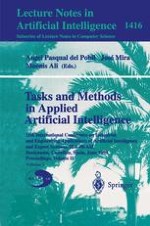1998 | ReviewPaper | Buchkapitel
Temporal difference learning in Chinese Chess
verfasst von : Thong B. Trinh, Anwer S. Bashi, Nikhil Deshpande
Erschienen in: Tasks and Methods in Applied Artificial Intelligence
Verlag: Springer Berlin Heidelberg
Enthalten in: Professional Book Archive
Aktivieren Sie unsere intelligente Suche, um passende Fachinhalte oder Patente zu finden.
Wählen Sie Textabschnitte aus um mit Künstlicher Intelligenz passenden Patente zu finden. powered by
Markieren Sie Textabschnitte, um KI-gestützt weitere passende Inhalte zu finden. powered by
Reinforcement learning, in general, has not been totally successful at solving complex real-world problems which can be described by nonlinear functions. However, temporal difference learning is a type of reinforcement learning algorithm that has been researched and applied to various prediction problems with promising results. This paper discusses the application of temporal-difference-learning in training a neural network to play a scaled-down version of Chinese Chess. Preliminary results show that this technique is favorable for producing desired results. In test cases where minimal factors of the game are presented, the network responds favorably. However, when introducing more complexity, the network does not function as well, but generally produces reasonable results. These results indicate that temporal difference learning has the potential to solve real-world problems of equal or greater complexity. Continuing research will most likely lead to more responsive and accurate systems in the future.
